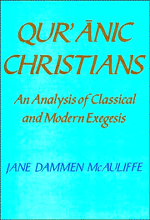Book contents
- Frontmatter
- Contents
- Acknowledgments
- Abbreviations
- Introduction
- PART I QURʾĀNIC COMMENTARY AND COMMENTATORS
- PART II QURʾĀNIC COMMENDATION OF CHRISTIANS
- 3 Nazarenes of faith and action
- 4 Followers of the Qurʾānic Jesus
- 5 Steadfast and submissive
- 6 The promised bounty of piety
- 7 The praiseworthy amity of Christians
- 8 Christians as pre-Qurʾānic Muslims
- 9 Compassion, mercy, and monasticism
- Conclusion
- Works cited
- Index of Qurʾānic verses
- Index of names and subjects
3 - Nazarenes of faith and action
Published online by Cambridge University Press: 24 February 2010
- Frontmatter
- Contents
- Acknowledgments
- Abbreviations
- Introduction
- PART I QURʾĀNIC COMMENTARY AND COMMENTATORS
- PART II QURʾĀNIC COMMENDATION OF CHRISTIANS
- 3 Nazarenes of faith and action
- 4 Followers of the Qurʾānic Jesus
- 5 Steadfast and submissive
- 6 The promised bounty of piety
- 7 The praiseworthy amity of Christians
- 8 Christians as pre-Qurʾānic Muslims
- 9 Compassion, mercy, and monasticism
- Conclusion
- Works cited
- Index of Qurʾānic verses
- Index of names and subjects
Summary
The first clear instance of Qurʾānic approbation of Christians denies them the stature of singularity. It compliments them in a cluster, yoked with others in a common nod of approval. The verse links Christians with Jews, with a somewhat mysterious group named the Ṣābiʾūn, and yet more generally, with any who believe in God. A preliminary translation offered here is tagged with the proviso that should mentally accompany the translation of each of the verses as they occur. Any translation is, of course, an exegetical act, a choice among varying – sometimes competing – understandings of the text. To provide a translation at this introductory stage inevitably compromises, to some degree, the unfolding presentation of that range of exegetical options which have been exercised in the long history of commentary on these verses. Yet to make this discourse accessible to the non- Arabist, provisional English renderings must be given. In each instance, however, this rendering is best read as preliminary, as simply a way to begin the hermeneutical conversation. The verse with which this chapter deals is from the second sūrah of the Qurʾān, sūrat al-baqarah (2):62:
Truly those who believe and those who are Jews, the Christians and the Ṣabiʾūn, whoever believes in God and the Last Day and does right, for them is their reward near their Lord; they will have no fear, neither will they grieve.
The interpretation of this verse, as it has developed over the many centuries of Muslim exegetical activity, may be divided into a series of overlapping questions. It should be made clear at the outset, however, that these questions do not reflect categories or subdivisions within the individual commentaries themselves.
- Type
- Chapter
- Information
- Qur'anic ChristiansAn Analysis of Classical and Modern Exegesis, pp. 93 - 128Publisher: Cambridge University PressPrint publication year: 1991



